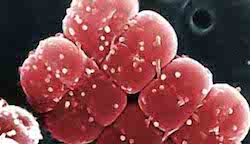DEINOVE has entered into a collaborative agreement with SUEZ ENVIRONMENT Group to explore the potential for developing a new industrial sector for transforming urban organic waste into ethanol through the use of Deinococcus bacteria. The goal of the two-year agreement is to define the optimum conditions for producing ethanol on a per-industrious scale.
Today, organic waste is essentially recycled through composting and methanization. The abundant availability of this source of carbon, its cost and its composition, which is favorable to the growth of microorganisms, make it a realistic candidate for innovative recycling into molecules of industrial interest, including commodities, according to DEINOVE.
 “With its amazing capacity for effectively degrading all types of biomass, Deinococcus creates value from waste that is little used today,” said Emmanuel Petiot, CEO of DEINOVE. “In cooperation with SUEZ ENVIRONNEMENT, one of the world leaders in processing and recycling waste, we are expanding our potential markets and are contributing to the development of a real circular economy.”
“With its amazing capacity for effectively degrading all types of biomass, Deinococcus creates value from waste that is little used today,” said Emmanuel Petiot, CEO of DEINOVE. “In cooperation with SUEZ ENVIRONNEMENT, one of the world leaders in processing and recycling waste, we are expanding our potential markets and are contributing to the development of a real circular economy.”
During the past six months, DEINOVE has been working with SUEZ ENVIRONNEMENT who has been providing various types of waste coming from its processing units. The results of this upstream research phase have confirmed that these substrates can be transformed into interesting molecules, including ethanol, by Deinococcus bacteria.
As a result of the R&D, the partners have decided to undertake a two-year collaborative extension of their DEINOL programme. The first phase will focus on optimizing the main stages of the process’ development including: choice of substrates supplied by SUEZ ENVIRONNEMENT and pretreatment conditions; choice of a Deinococcus strain adapted to these substrates; and the definition of the conditions for fermentative production in order to achieve a satisfactory ethanol production rate in 20-L bioreactors.

